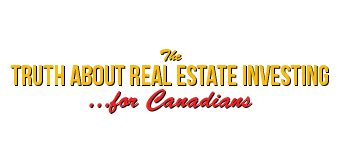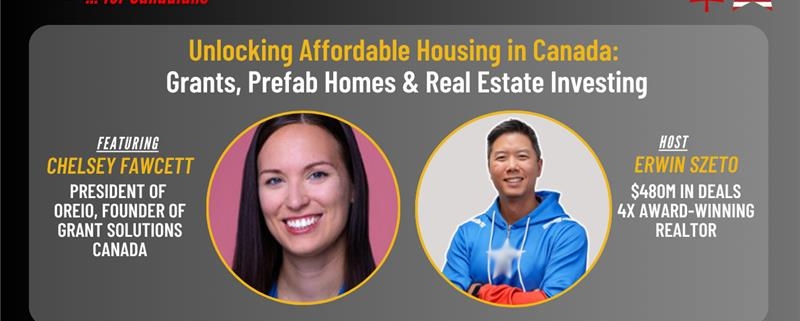How Canadian Developers Are Using Grants to Fund Affordable Rentals (Without Giving Up Control)

Recorded: November 2025
Guest:️ Chelsey Fawcett, OREIO President and Founder of Grant Solutions Canada
Host: Erwin Szeto, The Truth About Real Estate Investing for Canadians Podcast
Affordable rental development in Canada is tough: land and trades are expensive, and rents can’t float to infinity. Grants—federal, provincial, municipal—and targeted credits can bridge the gap. In this episode, OREIO President and Grant Solutions Canada founder Chelsey Fawcett explains how developers build grantable projects, why many funds prefer build-and-hold rentals, and how manufacturing/employment grants support prefab and tiny-home production that lowers costs and speeds delivery.
Key Takeaways:
- Grants fund solutions to public problems. Today’s problem is affordability; projects that reserve a share of units below local medians score higher and can unlock forgivable loan components. Developers should expect strict definitions (e.g., ~80% of median rents, program-dependent).
- Don’t double-dip CMHC programs. MLI Select and the Affordable Housing Fund serve different aims; you can’t stack them. Plan your capital stack early.
- Manufacturing & jobs matter. Prefab/tiny-home companies can access manufacturing, employment, export and environmental credits—separate from project grants—to reduce unit costs and scale production.
- Eligibility is real. Funders review your team, 3 years of financials, and risk. Many good ideas need gap-analysis work (governance, revenue diversity) before submitting.
- OREIO’s role: a growing hub (2nd Wednesdays) for investors to cross-pollinate and learn; yes, they’re recording sessions for members.
What This Means for Canadian Investors:
If you’re evaluating multi-family development, assume conventional financing alone may not pencil at today’s costs. Map your affordability commitments and non-dilutive funding sources early, then structure build-and-hold pro formas that satisfy program terms. Consider prefab partners to lock pricing, shorten timelines, and potentially qualify for manufacturing support on top of housing funds.
Resources:
- Grant Solutions Canada (intake): grantsolutionscanada.ca. Grant Solutions Cana
- OREIO membership & events: oreio.org. oreio.org
- Small Living Company (Ontario tiny homes; some through Home Depot): smallliving.co. smallliving.co
🎧 Listen to the full episode here
Government Grants for Real Estate Developers, Q&A With Chelsey Fawcett
- What grants are available for Canadian real estate developers?
Available grants federal (e.g., CMHC/NHS), provincial, and municipal programs fund affordable rental supply; you can also stack tax credits, SHRED, employment, and manufacturing support where applicable. Canada Mortgage and Housing Corporation
- Do CMHC grants require affordable rents?
Yes—programs commonly require a portion of units priced below area median market rents for a set term, sometimes paired with forgivable-loan components.
- Can I combine CMHC MLI Select with the Affordable Housing Fund?
No; they’re separate programs with different aims, and double-dipping isn’t allowed. Build your capital stack around one or the other.
- What size of project makes sense to hire a grants firm?
Pipelines ≥ $1M (often 40–300+ units) benefit from strategy, lobbying, and underwriting support to increase award odds and speed.
- Are tiny homes eligible for grants?
Manufacturers can access manufacturing, employment, export, and environmental programs; project-based housing grants depend on the affordability criteria and use case.
- Why do housing grants favor build-and-hold?
Affordability goals require long-term rent commitments; build-and-hold ensures units remain below market for the program term.
- What documents do funders review?
Developers should be prepared to provide three years of financials, details on corporate structure, pro formas, and a risk analysis. Many teams will also need to complete a gap assessment before submitting.
- How do I make my project more “grantable”?
You should reserve affordable units, incorporate energy-efficient or low-carbon features, demonstrate diversified revenue streams, and engage potential funders before applying.
- Is networking still valuable for funding?
Yes—groups like OREIO offer monthly education + cross-pollination with seasoned investors, service providers, and policy-savvy experts.
- Where can Canadian investors start?
Audit eligibility, choose the right CMHC/provincial/municipal lane, and speak with a grant strategist to stack non-dilutive capital.
📜 Full Transcript
The full, cleaned transcript of my conversation with Chelsey Fawcett is available here for anyone who wants to dive deeper.
To Listen:
On Spotify: https://open.spotify.com/episode/2J3dGKJZQ2WF3EuJZhM8IR?si=9tNmf-4yQxi53Dze4YdfGw
Audible: https://www.audible.ca/pd/B0G14XZNXB?source_code=ASSGB149080119000H&share_location=pdp
YouTube: https://youtu.be/88j90CtXBAI
🦸♂️Household Hero? Here’s Your Next Step
If you’re a Canadian investor trying to build wealth safely and sustainably, Adam’s journey has valuable takeaways.
It might be time to revisit your current strategies—real estate, lending, or insurance—and ask:
- Do your investments match your long-term goals?
- Do you fully understand how your strategies work?
- Would a more conservative approach offer better peace of mind?
Real estate remains a powerful tool for building wealth, especially with careful underwriting and due diligence. Insurance can be useful too—but only if it supports your broader financial goals.
Need help with conservative, peace-of-mind investing—backed by Wall Street-style due diligence—plus financial planning with your best interests at heart?
Until next time, happy Canadian and USA Real Estate Investing.
Erwin Szeto,
Your Cross Border Investment Guy
Why I’m Investing in the U.S.
I’ve been investing in Ontario since 2005. It’s been a great run—starting with properties in the $100Ks, now reaching $800K–$1M. How much higher can it go? I don’t know.
The remaining appreciation potential doesn’t justify the risk. That’s why I advise clients to look to the U.S., where rental properties range from $150K–$350K USD, with rents between $1,400–$2,600/month.
These cash-flowing numbers are night and day compared to Canada. Plus, landlords have rights, there’s no rent control, and income is in U.S. dollars—which are stronger than Canadian dollars.
If you don’t believe that U.S. dollars are stronger, ask 100 non-Canadians what they’d prefer to be paid in.
To regain control of your retirement, check out the cash-flow properties at:
👉 iwin.sharesfr.com
How SHARE Makes It Easier
The best part? My U.S. investments are more passive than my Canadian ones. I work with SHARE, an asset manager that guides me through the entire process.
SHARE helps with:
- Finding quality income properties
- Structuring the legal and tax side
- Managing the property manager and insurance provider
- Saving time and money with preferred rates
They even advise on when to refinance or sell. SHARE supports investors across the U.S., which is why I plan to own in Tennessee, Georgia, and Texas. It’s like having a JV partner—without giving up ownership or control.
Final Thoughts
If increasing cash flow is your goal, I don’t know of a better strategy for most Canadians. Once more: iwin.sharesfr.com is where to see what boring, cash-flowing investing looks like on the path to financial peace.
This is how I’m making real estate investing great again—for my family and hopefully for yours too.
Sponsored by… Me!
This episode isn’t sponsored—except by my wife Cherry and me. Real estate investing is our life. It’s helped us build wealth and achieve peace of mind about retirement and our children’s future.
Interested in our systematic approach to real estate investing—the same one used by most of my podcast guests? Then check out:
📍 infinitywealth.ca/events
Till next time—just do it. I believe in you.
Erwin Szeto
W: erwinszeto.com
FB: facebook.com/erwin.szeto
IG: @erwinszeto
Disclaimer
As a committed advocate for transparent and responsible investing, I want to disclose that I am an Advisor to SHARE SFR (Single Family Rental). I hold equity in the company and earn referral commissions from clients I refer.
My endorsement of their model—focusing on positive cash flow and direct ownership—is based on personal experience and belief. Still, every investor should do their own due diligence.




Leave a Reply
Want to join the discussion?Feel free to contribute!